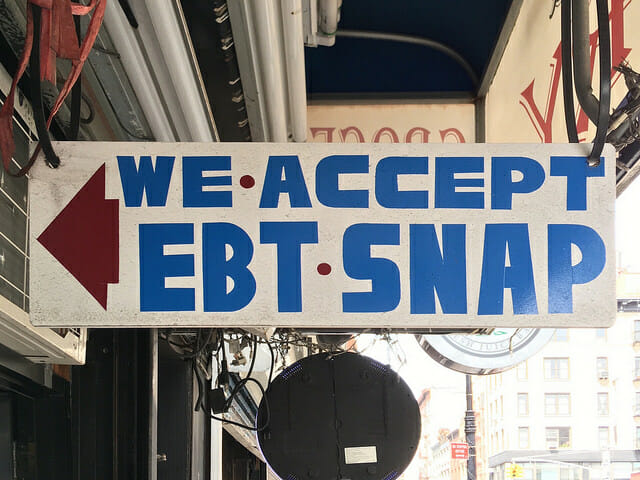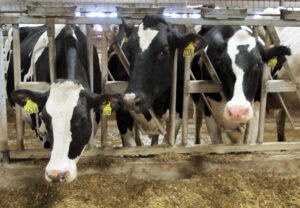USDA Uses Algorithm to Target Small-Business Owners in Its Crusade Against SNAP
Convenience stores and small groceries find themselves in the crosshairs; one New York grocer is losing over 35 percent of his business. Nick Sherman / Flickr Creative Commons
Nick Sherman / Flickr Creative Commons
Since the 2008 recession, the cost of Supplemental Nutrition Assistance Program (SNAP) benefits has nearly doubled, to $70 billion. The rise has made the federal nutrition program a frequent target of conservative politicians, including President Trump, who are convinced there is an epidemic of SNAP fraud. Never mind that the rise was “largely because the economic upheaval caused more Americans to need the help of food stamps to feed their families,” as Emelyn Rude wrote in Time in 2017.
In February, Trump suggested that most recipients should receive half of those benefits not in money they can spend as they see fit but in the form of a box of shelf-stable packaged foods, which the administration said would reduce the overall cost of the program by $129 billion over the next 10 years.
While neither the budget for SNAP nor the future of Trump’s “box proposal” has yet to be determined, the U.S. Department of Agriculture has found other ways to punish both SNAP users and the stores at which they shop.
On Monday, in collaboration with the nonprofit newsroom, New Food Economy, The Intercept published a report on a USDA algorithm, part of the department’s ALERT system, that in 2017 disqualified over 1,600 retailers from accepting SNAP benefits:
The ALERT system analyzes millions of SNAP transactions and assigns ratings to businesses based on the number of unusual transactions they process. Unusual transactions can include sales volumes that are much higher than those at neighboring stores, multiple withdrawals from the same card over a short period of time, multiple purchases that end in the same number of cents, or very frequent or large purchases.
“Over 90 percent of those businesses,” the Intercept writes, “are convenience stores or small groceries.”
The Intercept profiles one of those retailers, 128 P&L Deli Grocery, whose owner, Porfirio Mejia, found himself to be a target of the USDA because he accepted IOUs from several of his regular, SNAP-eligible customers. The practice, the Intercept writes, allowed him “to deliver food to elderly neighbors and settle up after they received their benefits.”
Unfortunately, as reported by the Intercept, it also “triggered a suspicious activity flag in the system. By allowing customers to rack up a few weeks’ worth of grocery bills before paying with their benefit cards, Mejia violated the agency’s rules, which prohibit retailers from establishing informal credit systems with their customers.”
The USDA suspected him of having committed fraud by trading food stamps for cash. Mejia collected letters from customers and produced reams of receipts but was unable to produce the exact itemized lists the USDA requested to absolve him. Mejia is now permanently banned from accepting food stamps, costing him from 35 percent to 40 percent of his income.
“Over 90 percent of those businesses are convenience stores or small groceries,” the Intercept reports. “And while some of them almost certainly engaged in the cash-for-food-stamps fraud that the system is designed to detect, many of them, like P&L, were probably unjustly caught in the crosshairs.”
“It’s a jerry-rigged system against small retailers unlike anything I’ve ever seen before,” Stewart Fried, an attorney who has represented store owners flagged by the algorithm, told the Intercept.
What hampers retailers’ ability to prove they are not committing fraud is that the USDA does not explain what sales figures, thresholds or ranges trigger their algorithms. One USDA official the Intercept cites, Douglas Edward Wilson, a program analyst, testified in 2017 “that he had no idea who originally set the parameters for flagging fraudulent transactions.”
The USDA defends its actions, claiming the ALERT system is merely one tool in a broader, more thorough fraud investigation.
Still, reversal rates are low, and the burden of proof is on the store. Unless they can afford an attorney, most store owners are stuck with the results. For his part, Mejia is cutting employee hours and working 14- to 15-hour days in an effort to stave off selling his business.
Read the entire article here.
Your support is crucial...As we navigate an uncertain 2025, with a new administration questioning press freedoms, the risks are clear: our ability to report freely is under threat.
Your tax-deductible donation enables us to dig deeper, delivering fearless investigative reporting and analysis that exposes the reality beneath the headlines — without compromise.
Now is the time to take action. Stand with our courageous journalists. Donate today to protect a free press, uphold democracy and uncover the stories that need to be told.






You need to be a supporter to comment.
There are currently no responses to this article.
Be the first to respond.